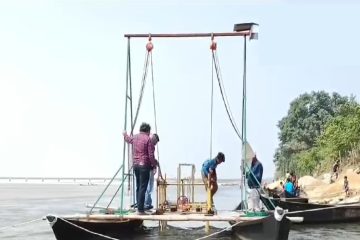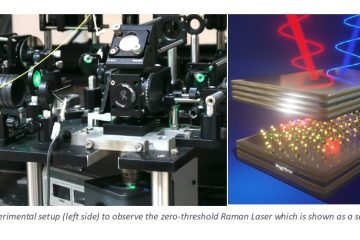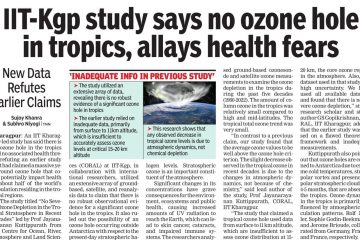IIT KGP and Technical University of Munich Join Hands to Shape India’s Emerging Intelligent Mobility Landscape
Business Standard (IANS Feed) Times of India Business Standard (PTI Feed) NDTV Economic Times Auto Canada Today CanIndia Outlook NewsBytes Jagran Josh

In an effort to evolve and give direction to the emerging intelligent mobility landscape in India, IIT KGP and the Technical University of Munich (TUM) from Germany are organizing a two-day workshop at IIT KGP on October 29th and 30th. This workshop is being held in the context of the newly-established Indo-German Collaborative Research Center on Intelligent Transportation Systems, which is currently a joint Center of IIT KGP and TUM, located within the IIT KGP campus, but seeks to involve multiple Indian and German academic and industry partners in the future. The workshop is also being supported by the Indo-German Science and Technology Center (IGSTC) and the German Federal Ministry of Education and Research (BMBF).
This workshop has brought together various transportation experts from Indian and German academia and industry – such as TUM, IIT KGP,TU Berlin, TU Chemnitz, IIT BBSR, IIT Patna, ISI Kolkata, TH Ingolstadt, Siemens, Bosch, Infineon, Intel, TCS, Ola Cabs, — as well as policy makers and law enforcement agencies, who will discuss potential solutions in the domains of Intelligent Solutions for Transportation Integration, Technologies for Electric Vehicles and Batteries, and Systems & Software Challenges in next generation vehicular technologies. While many Indian cities have a variety of transportation modalities ranging from metro trains to autorickshaws, India also has unique transportation challenges and vast opportunities that are of huge interest to both German scientists and the German industry. In order to meaningfully address such challenges, it is necessary for the academia and the industry from the two countries to work together very closely, which this workshop will attempt to facilitate.
The mobility landscape in India is also undergoing a rapid transformation. India is expected to have 200 million new EVs by 2030. With nation-wide emphasis on electric vehicles and battery technologies, the potential for developing customized intelligent vehicular technologies for EVs in India is significant, which provides great opportunities for both Indian and German industries and for them to work together. While German automotive technologies are a brand in itself, Indian software prowess is now also acknowledged all over the world. With more than 90% of innovation in the automotive domain currently now being in electronics and software, an Indo-German cooperation can create new technologies and solutions not only for India but also for the global market.
While Germany is considered to have among the world’s best public transportation systems, solutions from German cities cannot be directly implemented in India, due to its unique characteristics such as the volume of passengers, road conditions, and the variety of available transportation mechanisms, including buses, trams, suburban and underground trains, auto rickshaws, taxis, and ferry services. Hence, transportation solutions for India pose interesting problems for German researchers that need to be addressed in close cooperation with their Indian counterparts.
“Future transportation solutions in India must be developed with a holistic view of the wide milieu of options available in Indian cities, and integrated end-to-end solutions will make public transport in India more reliable and comfortable, and reduce the dependency on private vehicles” opined Prof. Samarjit Chakraborty of TU Munich, who along with Prof. Pallab Dasgupta from IIT KGP were the main initiators of the new Indo-German Collaborative Research Center on Intelligent Transportation Systems. This Center aims to establish collaborations at both academic and industry levels between Germany and India for developing next generation transportation technology suitable for Indian cities and to create an ecosystem in India that is conducive for the German and Indian Industry. “The focus of innovation today is in intelligent software for safety, driver assistance, comfort and entertainment. Combining the software and AI expertise of India with the manufacturing leadership of Germany can bring about transformational benefits to both countries. At this Center and with appropriate collaborations with industry partners in India and Germany, we are looking forward to shaping our research goals and schemes for long-term sustainability of the Center,” remarked Prof. Pallab Dasgupta, who is also the Dean of Sponsored Research & Industrial Consultancy, at IIT KGP.
India, with its Smart Cities Mission, aims to develop 100 smart cities in the near future. Intelligent and integrated green transportation systems will be a key component of these cities. This would not only bring forward challenges in integrating the wide milieu of transportation options in Indian cities, but might also require designing new transportation systems for addressing the huge demand for public and private transportation in Indian cities. At the Indo-German Center, experts from various industries of the two countries, traffic control, policy makers, and Indian and German academics would work together towards finding India-centric solutions for these challenges, along with new business opportunities. In addition to new automotive technologies by combining German engineering and Indian software skills, the research in this center could potentially revolutionize management, analysis, and intelligent services in transportation, including fleet management, vehicle-to-infrastructure interactions, and cloud-based vehicle health monitoring, by combining technologies from the domains of wireless networks, smart sensing, smart wayside infrastructures, AI and machine learning.



